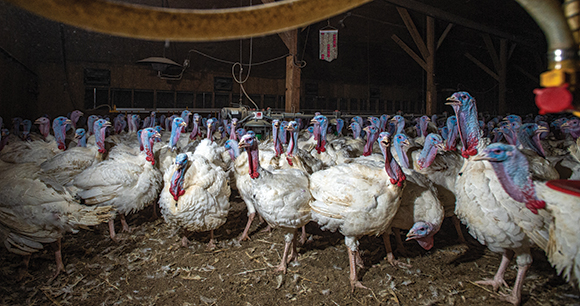Bird Flu Affects Millions of Animals, Including Dairy Cows
Over two years have passed since the first case of highly pathogenic avian influenza (or “bird flu”) was confirmed in the United States during the most recent outbreak, and the virus continues to wreak havoc on animal populations, domestic and wild. Worldwide, millions of wild birds are estimated to have died, and over 48 species of mammals have been infected.

In the United States, bird flu has triggered “depopulations” of poultry flocks, resulting in the mass killing of over 90 million birds, on farms in almost every state. Ventilation shutdown plus heat (VSD+)—halting airflow and boosting temperature until trapped animals die from heatstroke over several hours—continues to be used at an alarmingly high rate in such depopulations. Public records analyzed by AWI indicate that, from February 2022 through December 2023, at least 66 million birds—around 81 percent of those killed during this period—were killed in depopulations in which VSD+ was used for the entire flock or in at least one barn on the premises.
To add to this troubling situation, bird flu has now jumped to dairy cattle, raising concerns about food safety and transmission to humans. Since March, the bird flu virus has been confirmed in dairy herds in 12 states, and infections have been confirmed in three dairy workers—one in Texas and two in Michigan.
To limit the spread, the federal government has established restrictions on the interstate movement of cattle and begun testing milk samples for presence of the virus. A Food and Drug Administration study conducted in April found that one in five samples taken from the retail milk supply contained virus fragments, although the agency believes these fragments to be noninfectious.
Program Terms: Farmed Animals
AWI Quarterly Terms: Quick Read
Related News
Titus Reintroduces Humane Transport of Farmed Animals Act as New AWI Report Reveals Feeble Enforcement of Welfare Violations
In Program: Farmed AnimalsToday, US Rep. Dina Titus (D-NV) reintroduced the Humane Transport of Farmed Animals Act to improve conditions for livestock transported across the United States. The bill would...
New Poll: Consumers Overwhelmingly Support Meaningful Standards for “Humanely Raised” Food Label
In Program: Farmed AnimalsEighty-eight percent of American consumers believe that claims such as “humanely raised” or “sustainably farmed” on meat and poultry products should be based on meaningful,...
New Research: USDA Fails to Pursue Prosecutions of Slaughter Plants, Despite Repeat Violations
In Program: Farmed AnimalsRepeat violators of the federal Humane Methods of Slaughter Act (HMSA) continue to escape meaningful enforcement by the US Department of Agriculture, resulting in continued...
AWI Scholarship Winners Campaign for a Better World for Animals
In Program: Animals in Laboratories, Farmed AnimalsThe Animal Welfare Institute (AWI) announced today the 12 winners of a scholarship designed to invest in future leaders who seek to improve the lives...